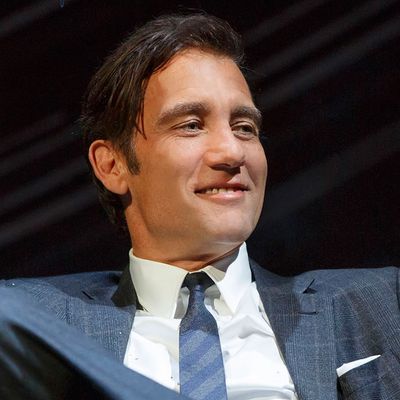
Harold Pinter wrote Old Times (which opens tonight at the Roundabout) in 1971, only eight years before Caryl Churchill wrote Cloud Nine (which opened last night at the Atlantic). Though both are English plays about sex and subjugation, the two revivals demonstrate just how differently classics can fare as time laps around them. Cloud Nine has grown larger, almost as if it had predicted and made room for its future relevance. Old Times, on the other hand, seems to have contracted, especially in a production that makes too much of a case for its cosmic importance.
Not that Old Times is unimportant. It is, among other things, one of those works that helped establish the adjective Pinteresque as a troubling and cool thing for a play to be: It is mysterious, pregnant, and hostile. The action consists entirely of conversation that is alternately cryptic and banal, as two of the characters wrangle over what seems to be ownership of the third. The wranglers are Deeley and Anna; he’s a filmmaker and she’s a rich man’s wife. At the top or the bottom of the triangle, depending on which way you hold it, is an enigmatic woman called Kate. Though Deeley is her husband, an anxious, overcompensating type who keeps her, almost as a kind of Rapunzel, in a converted farmhouse near the sea, Anna has the prior claim; twenty years before the play’s action the two women shared a London flat, and possibly a bed, or at any rate some panties. When Anna comes for a visit during a rare trip back to England from her glamorous life on a mountainside near Taormina, the three spend an evening discussing vegetarian casseroles, the movie “Odd Man Out,” and the fun of the old days, which seems neither old nor even quite real. Each person’s past is its own story, and the stories don’t match.
Pinter means to keep the audience on its toes: There is detective work to be done, sorting out the relationships and alibis. The characters, both in their tastes and distastes, are perfectly etched. (It’s a marvelous touch that Anna uses words like “lest” and “gaze” that Deeley finds posh, and then throws back at her like little stink bombs.) And, at a fleet 70 minutes with no intermission, the play smartly limits your exposure to the intense narcissism of people playing a game of erotic musical chairs. But for all its verbal brilliance and surgical precision in dissecting the characters’ personalities, Old Times no longer feels quite real, if it ever did. (I didn’t see the 1971 Broadway premiere, with Robert Shaw, Rosemary Harris, and Mary Ure, or the Roundabout’s 1983 revival, with Anthony Hopkins, Jane Alexander, and Marsha Mason.) The central problem is the conception of Deeley, one of those Pinter men whose essential thuggishness is just barely disguised by a social veneer. I have no doubt that such men exist, perhaps no less now than in 1971. But the play doesn’t make the case, because it didn’t have to, that women as smart and sophisticated and emotionally powerful as Kate and Anna would give him the time of day. This throws off the equilibrium of the triangle, making its resolution more or less obvious, if it weren’t already so from other Pinter plays like The Homecoming.
In this way, the anxiety of ownership that besets Pinter’s Deeleys in their dealings with Kates and Annas is beginning to feel dated, and icky. That’s a good thing if you see Old Times as a period piece: a record of a time when men like this were being left behind and not liking it. But if you see the play as a profound portrait of a permanent human condition, it’s going to disappoint, which is exactly the trap Douglas Hodge’s production falls into. Best known here as an actor, Hodge has appeared in several Pinter plays, some with Pinter himself directing; a program note makes much of his dramaturgical bona fides. Perhaps his fides are a little too bona. He has encouraged an excellent cast — Clive Owen as Deeley, Eve Best as Anna, Kelly Reilly as Kate — to play the subtext so broadly that it basically everts the drama, leaving very little sense that feasible humans are involved. Even so, the actors are good enough to make it fun: Owen a monkey on a hot-tin roof, Best a Sicilian goddess, Reilly an impossibly sexy sphinx. (Constance Hoffman’s costumes for the women are especially fetching, in a ’70s way.) But with neither the history nor the hostility very mysterious, the sum on this one-plus-one-plus-one plot is zero.
And then it gets multiplied. You know you are in for an important statement when the spooky music (by Thom Yorke of Radiohead) is already playing on a loop with crashing waves when you enter the theater. The curtain then goes up on a Japhy Weideman light show: a series of strob-y flashes catching the cast in various guilty configurations, like crime photographs. The great designer Christine Jones has also been encouraged to think big, which she has no trouble doing; the converted farmhouse Pinter calls for is, apparently, an outpost on some outer planet, with lava for floors, a block of ice for a window, and star tracks circling endlessly behind. We are meant to understand that we are in an elemental place, and this is beautifully done. But rather than helping us feel whatever elementality exists in the play, which time has in any case largely leached from it, the big idea only minimizes it further. The women, and especially the man, seem very puny indeed.
Perhaps that was Pinter’s intent all along; he was not notably pro-anthropic. You have to think, though, that he’d want productions of his plays to make the best case for his characters as written, rather than offering, as here, a gorgeously worst-case scenario.
Old Times is at the American Airlines Theatre through November 29.

